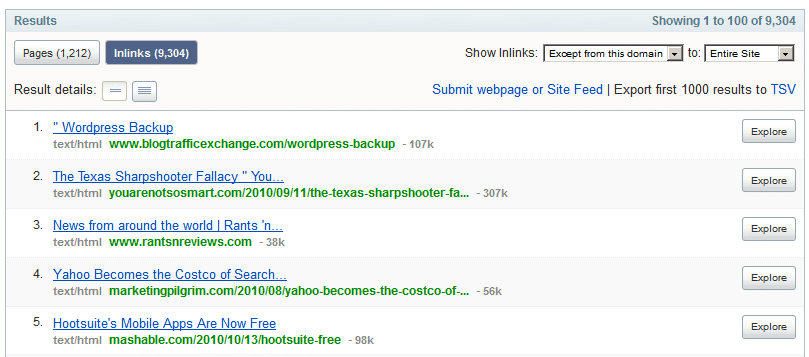Last time out, in Analytics Part 1 of 2, we talked mostly about website analytics and how easy it is today to simply add Google Analytics to your website.
Today, we take a slightly different tack.
Alexa
If you're a US-based company, you can get a good estimate of where you rank in terms of traffic by visiting Alexa.com.
Here's my view:
Simply type your full URL in the Search bar and off you go.
A lower number is better. If you're trending down to a lower number, things are looking up!
I admit, I don't follow my Alexa ranking closely at all. I think doing so is like weighing yourself every day–you see little progress or even a setback and BOOM!–you're discouraged and give up.
BUT! It's a good idea to check your rank periodically. I check mine about once a month.
The three figures in the picture above are, respectively, your overall rank (global), your US rank, and the number of backlinks you have within sites visited by Alexa users.
A bit of background: Alexa is a third-party traffic analyzer. They rely on a toolbar that works only in Internet Explorer and individual users have to install it. Therefore, Alexa is sort of like the Nielsens for TV–from a relatively small sample size, a lot of extrapolation takes place.
Bottom line: Beware your Alexa ranking. It is not the "be all, end all" — watch the trend. Make progress. Use the data within Alexa to see how you're performing, relative to past time periods.
Pages of content
You know that "content is king." Always has been, always will be. Google and the other search engines place a lot of weight on how much good content your site has. Therefore, it's imperative for you to add as much quality content to your site as possible. And let's get this out of the way: It doesn't take long to create your own unique, quality content. This post, for example, will take me about 10-15 minutes.
Do that every business day of the week and before you know it, you have 250 pages of content after a year. Not too shabby.
There is a difference between how many pages you have published versus how many pages Google has indexed. You can see how many pages you have written simply by going to your WordPress dashboard and clicking on "All Posts." If you're using a static HTML site, you can go to your ftp client and see the page count.
However, for one reason or another, Google may not have visited all of your pages. Any page that Google doesn't visit, it cannot index. Consequently, if a page is not indexed,it will never be ranked.
Here's a search you can perform in Google to see how many pages have been indexed by the Big G:
site:yourdomain
Mine looks like this:
Note the 2,080 results. That's how many "pages" I have posted on my site. Note also that those pages contain pages generated by WordPress like archives, tagged collections, and category collections. I haven't written 2000 posts!
Nevertheless, Google thinks I write a lot of content!
Sites linking to your content
Another thing to consider when analyzing your website statistics is to look at the number of websites linking back to yours. The search engines place a HUGE premium on who and how many sites link back to yours.
It's like a referral in the real world: If a site gives you a backlink (as they're called), there is an implied endorsement of your website. The more the merrier. And the more "authoritative" the source, the better.
10 backlinks from .edu domains (they have tremendous authority in the eyes of Google and the other SEs) are worth about 5000 from sites with little authority (like mine!).
Here's how you can get a rough estimate of how many sites have linked back to you–type this in a Google search:
link:yourdomain
Here's mine:
I have 9,000+ links back to my site. That's pretty good.
But don't let the raw number fool you–I can guarantee that my 9000 can be easily trumped by bigger names in the internet marketing space.
The moral of the backlinking story is that it's a constant battle: You need to get more and more because you want to become the authority in your space AND you want to keep up or get ahead of your competition.
Speaking of competition: You can perform these searches on your competitors and see how they're doing. You can see exactly what they have written about (visit their sites) and you can see exactly who has linked back to them.
The web is more transparent now than ever before. You can get a firm grip on what your competition is doing and then formulate a plan to beat them.




